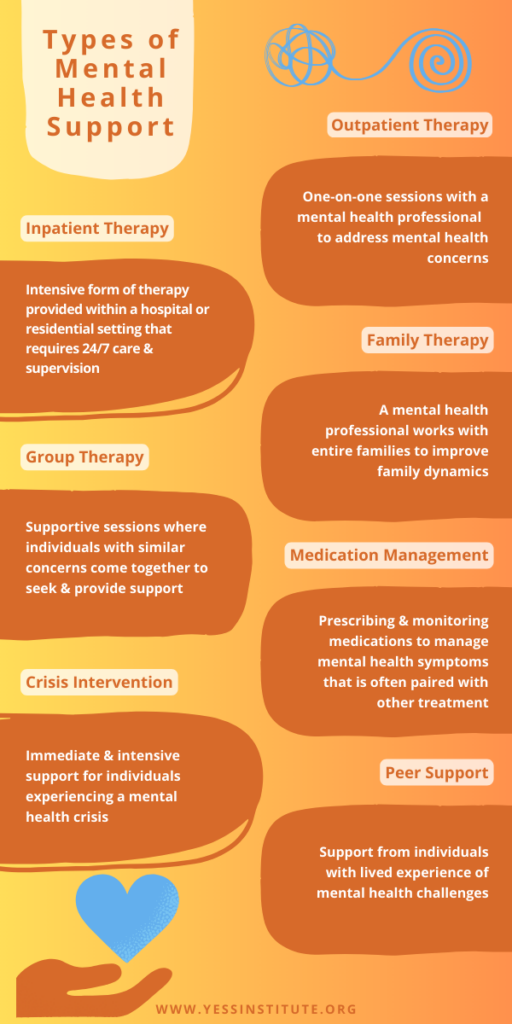In the realm of mental health support, the terms counseling and therapy are often used interchangeably, but they entail distinct approaches to healing and well-being. Counseling generally involves short-term discussions aimed at problem-solving and managing immediate concerns. On the other hand, therapy is a broader term that encompasses longer-term, in-depth exploration and resolution of emotional and psychological issues. While the two terms may be used interchangeably, their focus and intensity vary, making each appropriate for different needs and circumstances.
Despite which one a person utilizes, both play a vital role in promoting mental health by providing individuals with a safe and confidential space to explore their thoughts, emotions, and behaviors. They facilitate personal growth, self-discovery, and the development of coping strategies, fostering improved overall well-being and life satisfaction.

Overcoming Barriers to Seek Help
Accessing mental health care can be hindered by various barriers. One significant obstacle is the cost and availability of insurance coverage. Many individuals struggle with high deductibles, copayments, or lack of insurance altogether, limiting their ability to afford therapy. Additionally, not all therapists accept insurance, further limiting options for those reliant on insurance coverage.
The mode of therapy, whether virtual or in-person, can also present a barrier. While virtual therapy offers convenience and accessibility, some individuals may prefer in-person sessions due to concerns about the effectiveness of virtual communication or a lack of privacy at home. Additionally, for those contending with commuting challenges or residing in remote areas, accessing in-person therapy can be burdensome, underscoring the importance of considering geographical factors when addressing this barrier. Striking a balance between preference and accessibility is crucial in overcoming this barrier.
Long wait times for therapy or other mental health appointments can be discouraging for those seeking timely support. Overburdened mental health systems often result in delays, exacerbating mental health conditions and discouraging individuals from seeking help. Establishing more efficient scheduling systems and increasing the mental health workforce can help address this issue.
Lastly, building a strong therapeutic relationship is vital for effective treatment. However, establishing trust and comfort with a therapist can be challenging, especially for individuals who have had negative experiences or fear judgment. It's crucial to acknowledge that as a client, you wield agency over your care. If the rapport and dynamics within the therapeutic relationship are unsatisfactory, you possess the autonomy to seek a different therapist. Educating individuals about the therapeutic process and encouraging open communication can mitigate this barrier.
Evidence of Healing: Benefits of Therapy
Individuals who engage in therapy often experience improved emotional regulation, enhanced self-esteem, and a greater sense of self-efficacy. Research provides compelling evidence of the positive impacts of therapy on mental health and one’s overall well-being. When a person engages their senses, acquires new knowledge, encounters stressful situations, or undergoes various life experiences, their brains have the capacity to undergo structural and functional changes (Mental Health America, n.d.). This implies that both external stressors can contribute to mental health challenges, but it also highlights the potential of certain experiences, such as therapy, to positively alter brain structure and function towards a healthier state (Mental Health America, n.d.). Additionally, research indicates that behavioral and emotional interventions are as effective as, or sometimes more effective than, medication in treating a range of mental health conditions, including anxiety, depression, and obsessive-compulsive disorder (OCD) (Mental Health America, n.d.).
Moreover, therapy helps individuals develop coping skills, resilience, and healthier interpersonal relationships. It equips individuals with the tools to manage life's challenges, improve communication, and make more informed decisions. For those dealing with trauma, therapy can be instrumental in processing and healing emotional wounds.
Therapy: Integral Connection to Social Emotional Learning
Social-emotional learning (SEL) involves acquiring the skills to understand and manage emotions, set and achieve positive goals, feel and show empathy, establish and maintain positive relationships, and make responsible decisions. Therapy plays a crucial role in fostering these skills by providing a safe space for individuals to explore and develop their emotional intelligence, self-awareness, and interpersonal capabilities. By integrating therapy into educational frameworks, like those provided by YESS Institute, we can empower youth to thrive not only academically but also emotionally and socially.
The YESS Institute is a distinguished local non-profit organization that specializes in delivering comprehensive Social and Emotional Learning (SEL) programs to students attending schools within the Denver Public Schools and Westminster Public Schools. Their programs are designed to empower young individuals with crucial life skills, including but not limited to self-awareness, emotional regulation, and responsible decision-making.
By providing these vital tools and knowledge, the YESS Institute's initiatives not only support the therapeutic aspect of SEL but also fortify the foundation for the emotional and social well-being of the students they serve. This strategic approach helps students in developing a deeper understanding of their emotions. It also helps enhance their ability to manage them effectively, and make informed and thoughtful choices in various aspects of their lives. Ultimately, the utilization of SEL programs such as those offered by the YESS Institute and the promotion of therapy both aim to foster resilient and self-assured young individuals, empowering them to navigate life's challenges with confidence and composure.
Conclusion
Understanding the differences between counseling and therapy, recognizing the various forms of mental health support available, addressing barriers to access, appreciating the evidence-backed benefits of therapy, and recognizing its connection to social-emotional learning programs like those provided by YESS Institute, are vital steps in promoting mental health and well-being within our families, educational institutions, and communities. Let us advocate for a more accessible, inclusive, and compassionate mental health support system for all.
References
References
Mental Health America. (n.d). Science behind therapy. Retrieved from https://mhanational.org/science-behind-therapy on October 17, 2023.